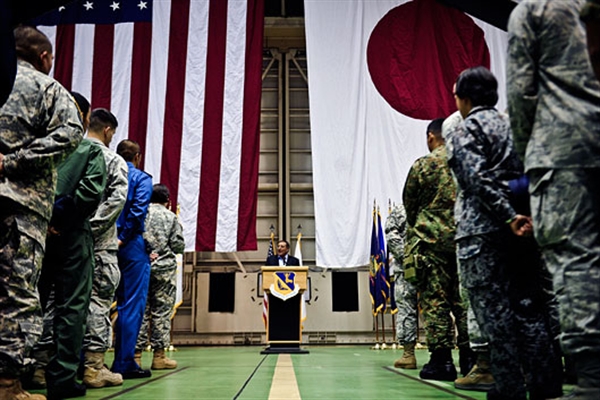PENTAGON OFFICIAL ASKS NATO PARLIAMENTARIANS TO KEEP UP THE MOMENTUM OF THE BUCHAREST SUMMIT
Sunday 25 May, in an address to the Defence and Security Committee meeting of the NATO Parliamentary Assembly in Berlin’s Reichstag, Daniel Fata, US Deputy Secretary Assistant of Defence for European and NATO Policy, said that the time has come to cement the gains from the Bucharest summit and noted the important role that members of the NATO Parliamentary Assembly can play in building parliamentary and public support to NATO.
The Bucharest summit produced a number of important gains according to Mr Fata. The Alliance reaffirmed its commitment to success in Afghanistan, moved forward toward producing a new Strategic Concept to guide the Alliance, and took important decisions on enlargement. There was also significant progress on achieving consensus with regard to the desirability and feasibility of missile defence systems in Europe.
Mr Fata underlined, however, that NATO members will not be able to reach their goals without a renewed financial commitment. He recommended an Alliance-wide increase in defence spending of 0.2 % of GDP and an increase in the percentage of deployable forces. Given the importance of finance ministers in budgetary decisions, he suggested that a periodic meeting of member state finance ministers should be held at NATO to underscore the importance of bringing defence spending in line with security priorities.
Regarding NATO’s relationship with Georgia and Ukraine, Mr Fata stated that they qualify for the Membership Action Plan (MAP). He noted a degree of frustration in those two aspirant members about not being offered a MAP in Bucharest, but underlined that NATO is committed to bring them onto a path for eventual membership if they continue to make progress on their reform commitments. Mr Fata affirmed that there is no reason that the conflicts in the breakaway regions of Abkhazia and South Ossetia should prevent the continued development of Georgia’s relationship with NATO noting that “nothing says that frozen conflicts prevent the granting of MAP.
Speaking specifically about the NATO mission in Afghanistan, Mr Fata welcomed the decision of France to deploy additional forces to eastern Afghanistan, but noted the lack of critical capabilities in theater that hindered the mission. In particular, he stated that more helicopters are needed to meet operational demands. He praised the training mission for the Afghan National Army (ANA) and Afghan National Police (ANP) and noted that ANA units were taking the lead in major operations against insurgents in southern Afghanistan. The appointment of a UN representative in Afghanistan, Kai Eide to bring unity of efforts of the international community on the civilian side and work closely with NATO’s International Security Assistance Force (ISAF), the EU and individual nations, will improve military and civil cooperation. Mr Fata insisted on the need of giving Mr Eide the necessary resources that would make the difference.
In his final point, Mr Fata said that parliamentarians have an important role to play in educating the public and their colleagues on the NATO mission in Afghanistan and the need to give the Alliance the capabilities it needs to pursue the common security agenda. He welcomed the input of parliamentarians to the Atlantic Charter and the Strategic Concept, documents to be drafted over the next two years that will guide the Alliance in the future.
The NATO PA, bringing together some 248 parliamentarians from 26 NATO member states, delegates from 16 associate countries, two Mediterranean associate countries, the European Parliament and parliamentary observers from several other countries, including Afghanistan and Pakistan, will meet for five days in Berlin in the Reichstag building, until May 27.
The NATO Parliamentary Assembly is an interparliamentary organization, independent from NATO, which provides a link between NATO and the parliaments of its member countries. The Assembly also brings together legislators from NATO member and non-member countries to consider security-related issues of common interest and concern.
Source:
NATO PA PRESS SERVICE, BERLIN
Roberta Calorio
Media Relations Officer
Mobile: + 49 173 6381 399

 von
von 

